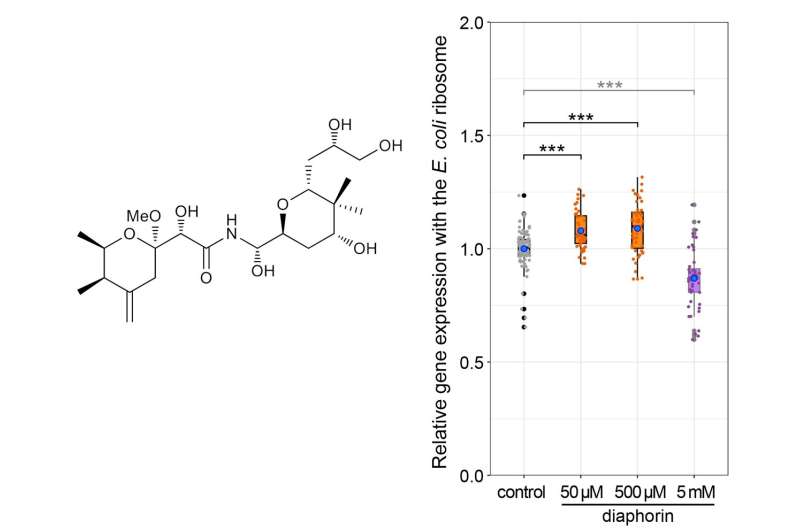This article has been reviewed according to Science X's editorial process and policies. Editors have highlighted the following attributes while ensuring the content's credibility:
fact-checked
trusted source
proofread
A compound produced by symbiotic bacteria promotes in vitro protein synthesis

A research team led by Associate Professor Atsushi Nakabachi of the Toyohashi University of Technology Research Center for Agrotechnology and Biotechnology has revealed that the compound diaphorin produced by an insect symbiotic bacterium promotes the activity of an in vitro protein synthesis system using Escherichia coli-derived components.
Their work clarified part of the action mechanism by which diaphorin promotes coliform growth and substance production, and it is expected to be applied to improving the efficiency of industrial production of useful substances using bacteria. The results of this research were published in the journal Microbiology Spectrum on June 4, 2024.
Diaphorin is a compound produced by a symbiotic bacterium of the global agricultural pest Diaphorina citri and is found in the pest's body at high concentrations of 2–20 mM. Previous research by the team showed that this compound improves the growth and substance production ability of E. coli.
This research is the first in the world to show that diaphorin at concentrations of 50–500 µM promotes the activity of an artificial protein synthesis system in a test tube, including ribosomes extracted and purified from E. coli, various enzymes, substrates, and other substances. This result suggests that diaphorin targets the bacterial gene expression system and exerts effects such as promoting growth and substance production.
E. coli is actively used not only in academic research but also in the industrial production of useful substances such as insulin (diabetic medicine), interferon (anticancer drug), growth hormone, and other medicines, as well as industrial enzymes, amino acids, and alcohol, including biofuels. The research result clarified part of the mechanism by which diaphorin promotes E. coli growth and substance production, and it opens the way for improving efficiency in the industrial production of useful substances using bacteria.
The research team aims to elucidate the molecular mechanism in more detail and continue to clarify the activity of diaphorin in a broader variety of bacteria.
More information: Rena Takasu et al, A limited concentration range of diaphorin, a polyketide produced by a bacterial symbiont of the Asian citrus psyllid, promotes the in vitro gene expression with bacterial ribosomes, Microbiology Spectrum (2024). DOI: 10.1128/spectrum.00170-24
Provided by Toyohashi University of Technology





















